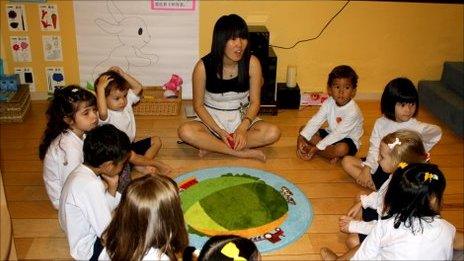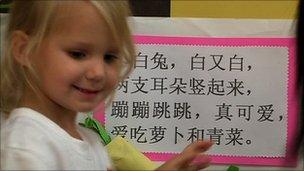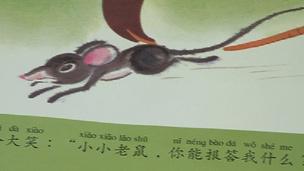Singapore's booming appetite to study Mandarin
- Published

Learning Mandarin could give these children a leg-up as China's economic importance continues to grow
At Rosemary Hall Montessori Kindergarten, in a classroom of 10 children from 12 nations, seven languages are spoken.
In Singapore, a nation state of more than 20 language, this is nothing special - not even for pupils who have just turned three.
The children are already adding another language to their repertoire: Mandarin Chinese.
"It is a very important language in my opinion," says Hilli Derold, whose two daughters, Emma and Maria, can now exchange morning greetings in three languages.
"Asia is the place to be for the future. By learning Mandarin, the girls will have a better understanding of the Chinese culture."
Multilingual education
Throughout the education system here, students are raised to be multilingual.

Aged three, Maria Derold is already trilingual
Sixteen-year-old Nikhil Choudhary can communicate in three widely spoken languages of the world.
"I speak English, my first language, Hindi, my mother tongue, Chinese and a bit of French," he says.
"I started studying Mandarin when I was at kindergarten. Initially it was not my choice. I have to thank my Principal at the kindergarten who had given my parents the opportunity to let me take up Chinese."
Nikhil's language skills will certainly open more doors for him in the future.
"I would like to become an ambassador for India to China," he says.
"It has been my dream since I was very young, to integrate China and India."
Chinese culture
There are four official languages in Singapore: English, Malay, Mandarin and Tamil.
When the country gained independence in 1965, the government decided to keep English as the main language in order to maximise economic prosperity.
Mandarin, however, has always been an important language too.
People of Chinese descent are the largest ethnic group, making up three quarters of the population.
In 1979, the Speak Mandarin Campaign was launched by the then Prime Minister Lee Kuan Yew and it has been re-launched annually since.
And as China climbs the global economic ladder, Singapore is pushing the usage of the language.
"The rise of China has pragmatic implications for the Chinese community in Singapore," says Lim Sau Hoong, chairperson of the Promote Mandarin Council.
"The campaign has moved beyond promoting the spoken language towards engaging Chinese Singaporeans to better appreciate the Chinese culture."
Useful language
Expatriates working in Singapore are also flocking to language schools.
"Since we started our Mandarin school in Singapore, we have had more than 1000 students enrol with us," says Lawrence Foong of New Concept Mandarin.

China's booming economy is boosting interest in Mandarin in Singapore
"Demand is increasing by at least 20% each year."
Ibn Talal from Belgium is one of the students.
Since he moved to Singapore eight months ago, he has started taking lessons.
As a business development executive for an international logistics company, it is a useful language for him to learn, he says.
"Mandarin is spoken by so many people," Mr Talal says.
There are more than a billion speakers, making it the world's most widely spoken language.
"By learning the language, hopefully I can understand the culture of the people that I work with," he adds.
'Soft power'
Similar eagerness to learn can be seen across the world.
India is considering introducing Mandarin lessons in state schools, while the Chinese language is now the most studied non-European language in the UK's high schools.
Hilli Derold's two daughters, Emma and Maria, can exchange morning greetings in three languages
According to the Chinese Ministry of Education, there were record 240,000 foreign students last year.
Beijing wants to double the number in the next 10 years by making it easier to obtain visas and offering more scholarships.
This is part of the country's push to increase its "soft power", a term widely used in international affairs as the ability to obtain what a country wants without force.
"China will attach more importance to cultural development, and conduct cultural exchanges with foreign countries more actively, so as to enhance the international influence of Chinese culture," Premier Wen Jiabao stated in the government report in March.
Lucrative and influential
A louder voice of the Chinese language media is considered one of the best tools.
Beijing has been investing billions of dollars in media and entertainment companies.
The country already produces more than 450 films per year, only 100 fewer than Hollywood in the US.
16 year-old Nikhil Choudhary is fluent in English, Hindi and Mandarin
Thanks to the country's growing middle class, the industry is expanding much faster than its American rival.
The total box office revenue rose from $648m (£408m) in 2008 to $928m in 2009. This year, it is expected to hit $1.53bn.
According to China's State Administration of Radio, Film and Television, domestically made movies contributed to 56.6% of the earnings.
In the publishing sector, more than seven billion books, three billion magazine and 44 billion newspapers are produced annually, generating $2.35bn.
Mainland China's music market is still relatively small, ranking 26th in the world's $17bn industry.
However, if you include Chinese language music from Taiwan, the sector is worth more than $1bn.
World dominance
As China emerges as the world's second largest economy, Mandarin is replacing Japanese as the Asian language of business.
US Treasury Secretary Timothy Geithner is known to speak the Chinese language.
It is not expected to replace English as the world's main language in the near future.
But in Singapore, the young are nevertheless hedging their bets.